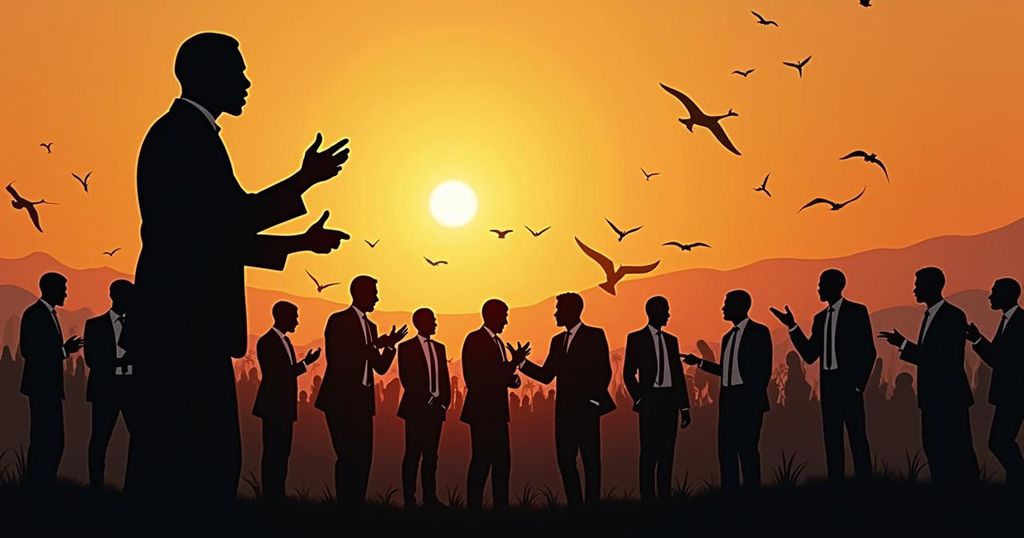Mozambique’s Elections: A Turning Point Towards Change Amidst Crisis

Mozambique is set to hold elections that may introduce a younger president for the first time since independence in 1975. With President Filipe Nyusi stepping down, four candidates are in contention, including Daniel Chapo of Frelimo and Ossufo Momade of Renamo. Key election issues include the armed conflict in Cabo Delgado, unemployment, and climate change. The results will begin to be announced soon after the polls close, with official tallies expected within 15 days.
Mozambique is poised to conduct significant elections, marking a potential transition of power to a younger cohort for the first time since the nation’s independence in 1975. With approximately 17 million of its 32 million citizens eligible to cast their votes, these elections encompass not only the presidential race but also parliamentary and provincial elections across eleven provinces. The current president, Filipe Nyusi of the Mozambique Liberation Front (Frelimo), who has held office for eight years, is stepping down, potentially concluding an era dominated by leaders who were involved in the struggle for independence. The electoral landscape features four key presidential candidates: 1. Daniel Chapo (47) – Chapo, a burgeoning political figure associated with Frelimo, has risen swiftly in the party ranks since entering politics in 2011. Promising to distance himself from the corruption scandals that have plagued his party, he advocates for restoring peace in Cabo Delgado, a region afflicted by ongoing violence. His campaign has gained traction, yet he faces skepticism from voters, particularly the youth, concerning Frelimo’s long-standing legacy of corruption. 2. Ossufo Momade (63) – As the leader of the opposition Renamo party, Momade remains firmly rooted in the traditional political fabric of Mozambique, having participated in the civil war and subsequently signing peace accords. His previous electoral loss in 2019, along with his party’s limited parliamentary seats, poses challenges for his presidential ambitions. 3. Venancio Mondlane (50) – A charismatic and youthful candidate, Mondlane commands the support of younger voters. Running as an independent with the backing of a coalition, he promotes promises to enhance job creation and address healthcare issues. His popularity raises concerns regarding potential post-election unrest. 4. Lutero Simango (64) – Head of the Democratic Movement of Mozambique (MDM), Simango’s campaign emphasizes industrial development to curtail unemployment among the youth. As the nation approaches the elections, three primary issues dominate the discourse: the ongoing armed conflict in Cabo Delgado, rampant unemployment and economic instability, and the pressing need for climate resilience due to the impacts of natural disasters and climate change. The results of these elections will begin to be announced shortly after polls close, with official tallies expected within 15 days following the vote, allowing time for any objections to be raised by contesting parties.
The elections in Mozambique are historically significant, as they represent the possible emergence of a younger leadership. Since gaining independence from Portugal in 1975, Mozambique has experienced political upheaval and corruption, notably marked by the tuna bond scandal, which involved significant financial misconduct within the ruling Frelimo party. As the electorate approaches these elections, there are urgent calls for reform from the younger population, who are increasingly disenchanted with the status quo. The persistent armed conflict in Cabo Delgado, alongside high unemployment and climatic adversities, poses formidable challenges that the incoming administration must address. This electoral cycle will not only determine the presidency but also has implications for the future direction of the nation as it grapples with these pressing issues.
In summary, Mozambique’s impending elections present a pivotal moment in the nation’s political landscape. The potential ascendancy of younger candidates reflects a growing desire for change among the electorate, particularly the youth, who seek solutions to entrenched issues such as armed conflict, unemployment, and climate vulnerability. As the electorate prepares to cast their votes, the outcomes of these elections will significantly shape the future trajectory of Mozambique, with expectations for accountability and reform from its leaders.
Original Source: www.aljazeera.com






